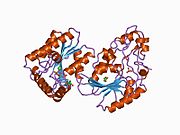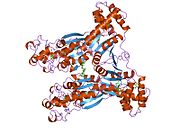PFKFB4
| PFKFB4 | |||
|---|---|---|---|
Gene ontology | |||
| Molecular function | |||
| Cellular component | |||
| Biological process | |||
| Sources:Amigo / QuickGO | |||
Ensembl | |||||||||
|---|---|---|---|---|---|---|---|---|---|
| UniProt | |||||||||
| RefSeq (mRNA) |
| ||||||||
| RefSeq (protein) |
| ||||||||
| Location (UCSC) | Chr 3: 48.52 – 48.56 Mb | Chr 9: 108.82 – 108.86 Mb | |||||||
| PubMed search | [3] | [4] | |||||||
| View/Edit Human | View/Edit Mouse |
6-phosphofructo-2-kinase/fructose-2,6-biphosphatase 4 also known as PFKFB4 is an enzyme which in humans is encoded by the PFKFB4 gene.[5][6]
Function
The bifunctional 6-phosphofructo-2-kinase (EC 2.7.1.105)/fructose-2,6-bisphosphatase (EC 3.1.3.46) (PFKFB) regulates the steady-state concentration of fructose 2,6-bisphosphate, an activator of a key regulatory enzyme of glycolysis, phosphofructokinase.
In 2012 research by scientists at Cancer Research UK’s London Research Institute show that an enzyme called PFKFB4 is essential for balancing these two processes – making sure the cell’s energy needs are met without allowing free radicals to build up and trigger cell death. Study leader Dr. Almut Schulze, said: “Our study suggests that PFKFB4 acts to fine-tune the process by which cells convert glucose into energy. Blocking this enzyme in prostate cancer cells grown in the lab stalled growth and triggered a catastrophic build-up of free-radicals, suggesting that it could be a suitable drug target. Importantly, this route to energy production is common to many different types of cancer, suggesting that drugs to target it could potentially be used to treat a variety of cancers.”[7]
References
- ^ a b c GRCh38: Ensembl release 89: ENSG00000114268 – Ensembl, May 2017
- ^ a b c GRCm38: Ensembl release 89: ENSMUSG00000025648 – Ensembl, May 2017
- ^ "Human PubMed Reference:". National Center for Biotechnology Information, U.S. National Library of Medicine.
- ^ "Mouse PubMed Reference:". National Center for Biotechnology Information, U.S. National Library of Medicine.
- PMID 8830046.
- PMID 10095107.
- PMID 22576210.
Further reading
- Pilkis SJ, Claus TH, Kurland IJ, Lange AJ (1995). "6-Phosphofructo-2-kinase/fructose-2,6-bisphosphatase: a metabolic signaling enzyme". Annual Review of Biochemistry. 64 (1): 799–835. PMID 7574501.
- Gómez M, Manzano A, Navarro-Sabaté A, Duran J, Obach M, Perales JC, Bartrons R (January 2005). "Specific expression of pfkfb4 gene in spermatogonia germ cells and analysis of its 5'-flanking region". FEBS Letters. 579 (2): 357–62. S2CID 33170865.
- Minchenko OH, Ochiai A, Opentanova IL, Ogura T, Minchenko DO, Caro J, Komisarenko SV, Esumi H (November 2005). "Overexpression of 6-phosphofructo-2-kinase/fructose-2,6-bisphosphatase-4 in the human breast and colon malignant tumors". Biochimie. 87 (11): 1005–10. PMID 15925437.
- Minchenko O, Opentanova I, Minchenko D, Ogura T, Esumi H (October 2004). "Hypoxia induces transcription of 6-phosphofructo-2-kinase/fructose-2,6-biphosphatase-4 gene via hypoxia-inducible factor-1alpha activation". FEBS Letters. 576 (1–2): 14–20. S2CID 20380862.
- Bobarykina AY, Minchenko DO, Opentanova IL, Moenner M, Caro J, Esumi H, Minchenko OH (2006). "Hypoxic regulation of PFKFB-3 and PFKFB-4 gene expression in gastric and pancreatic cancer cell lines and expression of PFKFB genes in gastric cancers". Acta Biochimica Polonica. 53 (4): 789–99. PMID 17143338.
- Ros S, Santos CR, Moco S, Baenke F, Kelly G, Howell M, Zamboni N, Schulze A (2012). "Functional metabolic screen identifies 6-phosphofructo-2-kinase/fructose-2,6-biphosphatase 4 as an important regulator of prostate cancer cell survival". Cancer Discovery. 2 (4): 328–43. PMID 22576210.



